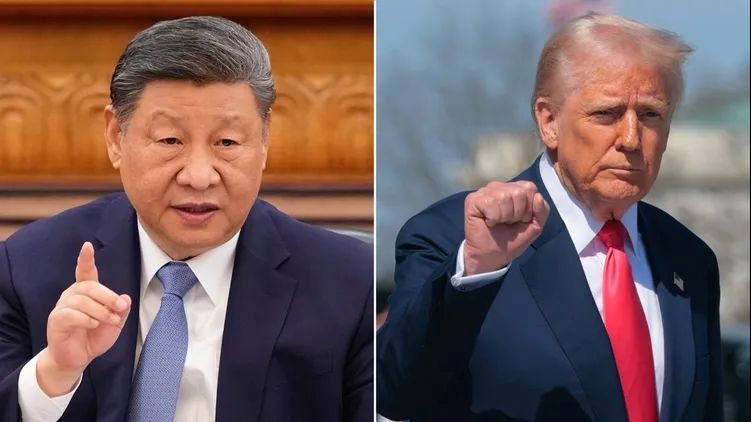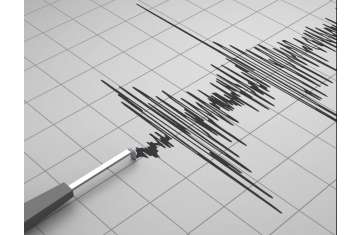Trump has declared war on China. It’s a trade war, not a shooting war. But the fallout will still be devastating and it will reach every corner of the globe.
The markets rallied on the news that Trump had blinked. He had reduced everyone’s tariffs to a blanket 10 percent—plus 25 percent for cars, aluminum and steel—except China.
Then tariffs on Chinese goods went up. China retaliated. They went up again. As of this writing tariffs on China stand at 145 percent. And Chinese tariffs on US goods are at 84 percent.
That effectively means that the world’s two biggest economies, who between them control 49 percent of global trade, have locked themselves out of each other’s markets. American farmers who rely on China for their sales will be left with crops rotting in the fields. And American shops that sell everything from t-shirts to I-phones will be left with the choice of either empty shelves or more than doubling their prices.
Trump promised to bring inflation down. It will go up. So will interest rates as the Federal Reserve Bank tries to control spiraling prices. Which means that mortgages and business loans will rise. As business costs rise so will unemployment.
These problems will extend far beyond American shores. There is more than a grain of truth in the saying “when American sneezes the rest of the world catches a cold.”
But there is more. If America can’t sell to China and China can’t sell to America then where will all the soybeans, wheat, steel, cars, computers… go. The answer is Europe, the UK, Japan, Australia, New Zealand, South Korea and India. This means that those countries goods will have to compete against Chinese and American businesses forced to dump their surplus output on third country markets. And, of course, all those countries will have to pay tariffs to export to America.
And there is more. Trump claims that the tariffs will increase foreign investment in America. Companies, he says, will build factories in the US in order to avoid US tariffs and sell to Americans. But will they? Most major businesses these days think in global not national terms. America is sealing its market off from the rest of the world and, anyway, it is quite likely to be in recession. Finally, foreign businesses crave economic stability. Trump’s up, down, in, out, unhinged shoot-from-the-hip economic policies are creating chaos rather than stability.
Perhaps most worrying of all, is the bond market. Bonds are effectively loans. US Treasury bonds are loans made to the US government to finance America’s trade deficit. At the beginning of the month America’s foreign debt stood at $7.9 trillion. Half of the debt is held by governments. Japan, China and Britain being the top three.
Japan was number one at about $1 trillion. But nipping at its heels was China with holdings worth about $860 billion. These figures seem high. They are and their size is what worries Trump. But the fact is that people buy American debt because they are investing in the American economy and the American economy is seen the best bet on the planet. Or at least it was.
After Trump announced his tariffs, American bonds started to be sold. No one knows who was selling them, but they were being sold. They are still being sold. This means several things: For a start the sell-off is the market’s massive vote of no confidence in Trump and the American economy. Furthermore, the dollar will reduce in value. Trump says he wants this because it will make American goods more competitive, but a drop in the value of the dollar will increase inflation which Trump doesn’t want. And then there is the danger that the dollar will cease to be the global reserve currency which is used for most international trade.
There is also the possibility that if China is pushed far enough by sanctions that it will go for the “Samson Option”. That is, it could opt to dump its American debt on the American market which would likely crash the dollar. It will also damage the Chinese Yuan which is why it is called the “Samson Option.”
On Thursday night, former Treasury Secretary Janet Yellen, said: “This is the worst self-inflicted wound that I have ever seen an administration inflict on a well-functioning economy… Trump has taken a wrecking ball to it.”
Former US Treasury Secretary Janet Yellen said on Thursday: “This is the worst self-inflicted wound that I have ever seen an administration inflict on a well-functioning economy… Trump has taken a wrecking ball to it.”
Republican Senators and Congressmen must be terrified of losing their jobs. And if they do go, they can only blame the man who helped put them in office— Donald Trump.
Before the economic meltdown, the Republican legislators were facing town hall meetings filled with constituents angry about Elon Musk’s chain saw approach to government, cuts in foreign aid, deportations of students and attacks on the constitution and the courts.
Almost to a man (or woman) they faced the crowds with a Trumpian smile that tried to reassure the voters that the president knew what he was doing and that he was going to “Make America Great Again”.
They had to say that because Trump and his billionaire acolyte Elon Musk held the campaign purse strings. The president has even managed to install his daughter-in-law, Lara Trump, as chairman of the Republican National Committee which vets candidates and channels party funds.
If a Republican candidate failed to pay obeisance to the MAGA leader and his policies then the next time they came up for re-election, Musk or another one of Trump’s billionaire friends, would finance their opponent in the primary elections for the nomination. In American politics, money talks.
Or does it? Elon Musk spent a record $25 million backing the Republican candidate in the race for a seat on the Wisconsin State Supreme Court. The Democrat candidate, Susan Crawford, won it by ten points. The electorate balked at being told what to do by an American oligarch who was working with Donald Trump to destroy the American government and its constitution.
What happened in Wisconsin could easily be a harbinger of political battles across America, especially now that economic chaos has set in. Inflation is rising despite Trump’s promises to bring it down. Most people don’t believe his promise to protect Medicaid and Medicare. Their pensions are sliding along with the stock market. And they don’t like the rest of the world hating them.
They voted for change. But not for the ill-planned unbridled change wrought by Donald Trump and his Republican sycophants in Congress and the cabinet.
There is an excellent chance of the Democrats winning both houses in the mid-term elections. They may even win a two-thirds majority in the Senate which will give them enough seats to impeach—and convict—Donald Trump for abuse of power.
But the mid-terms are two years away and Donald Trump has proven that he can wreak untold damage on America—and the world—in under 100 days.
Some Republican congressmen have spoken out against the president. Not enough. Many more have whispered their opposition in private but backed him when the cameras turned on them. If they can be persuaded by their town halls that their futures are damaged by association with Trump and assured by opposition to him than perhaps—just perhaps—Congress can grow a backbone.
________________________
The Iranians must be terrified of Trump. That can be the only reason they have agreed to meet in Oman this weekend to discuss swapping potential nuclear weapons for peace.
The reasons are clear. Tehran’s proxies in Lebanon and Gaza have been decimated. They have lost their string of bases in Syria and the Iranian-backed Houthis are suffering.
But most important of all, success has set Benjamin Netanyahu’s war-driven pulse racing. Destroying Hamas and Hezbollah is not enough for the Israeli prime minister. He wants to go after what he calls “the head of the snake”—Iran.
President Biden worked hard to keep a tight rein on Netanyahu’s blood lust, both in Gaza and Lebanon and towards Iran.
Trump appears willing to unleash him, maybe even with American help. He has proposed taking over Gaza, moving out the Palestinians and turning the area into a Middle Eastern Riviera. And as Netanyahu has increased his attacks in Gaza and the West Bank Trump has said nothing other than though to tell Hamas that “all Hell will break loose” if Hamas fails to release remaining Israeli hostages.
In the midst of all this turmoil Trump wrote a letter to the Iranian leadership proposing a deal to prevent Iranian nuclear weapons production in return for an agreement that neither Israel nor the US would attack Iran. The Iranians jumped at the chance.
But we are long way from the hurrahs. Negotiators need to work out a definition of what constitutes an end to Iran’s nuclear ambitions.
Iran has rejected the idea of total dismantlement of their nuclear program. They want to retain their nuclear power plants for “peaceful purposes. “The Americans, for their part, seem divided (as usual) on the correct approach. Steve Witkoff, Trump’s Middle East negotiator who will be leading the US delegation to Oman, said that a failsafe verification process was needed.
Mike Waltz, the National Security Adviser, said that all Iranian nuclear installations must be dismantled. Netanyahu is more specific: “They go in. They blow up the installations, dismantle all of the equipment, under American supervision and carried out by Americans.
Trump said: “It will be a very bad day for Iran” if this weekend’s talks are unsuccessful.
____________________________
The Trump Administration suffers badly from lack of joined up thinking or what I call the hip, thigh bone theory of the world The latter phrase relates to my belief that the world is interconnected in much the same way as the human body, and no matter how hard we try to organize it otherwise, it always will be so.
There are lots of specific examples of how Donald Trump has not grasped this basic theory of international politics, but I am just going to focus on two: defense and tariffs.
The current occupant of the White House has repeatedly called on allies to shoulder more of the financial burden of defense. In his first term he said that other members of NATO should be paying two percent of GDP on defense. In his second term he has upped it to five percent. He also suggested that America would refuse to defend a NATO ally that did not pay their fair share.
Defense is, of course, a government expenditure. Governments derive their revenues from taxes and the revenues from those taxes go up or down according to the state of a country’s economy.
Trump’s tariffs will be a big hit on the already fragile markets of the EU and UK. They will almost certainly go into recession. As a result the tax base will shrink; government revenues will drop and it will be much, much harder for NATO allies to increase their defense spending.
But even harder hit will be the developing countries. Lesotho, for example, has been threatened with a 50 percent tariff. This is because the tariff rates are not based on reciprocity but on the size of a country’s trade deficit with the US. Lesotho’s trade deficit in 2024 was $234.5 million.
The reason for the trade deficit was because Lesotho produces diamonds. There are no diamond mines in the US. It doesn’t buy much from the US simply because Lesothans don’t have the money. The country’s per capita income is $2,500. In fact, Lesotho was heavily dependent on $362.5m in US aid to run its water treatment plants and healthcare systems. That went with the 80 percent cut in US aid. Now Lesotho has neither trade nor aid. But then, as Trump said: “Nobody has heard of Lesotho.”
_______________________
The UK got off light on the tariff front—except potentially Northern Ireland, and this could have an impact on peace in the troubled province.
Trump has imposed a ten percent tariff on the UK—effective in just over 90 days—and a 20 percent tariff on the EU. That does not include cars, aluminum and steel which face a 25 percent tariff.
The Irish Republic, or Eire, is part of the EU and thus subject to the 20 percent tariff. And, thanks to the Windsor Framework, Northern Ireland is in the EU’s single market trading area. That means there is an open border between Eire and Northern Ireland and goods can travel tariff-free between the two halves of the island.
Businesses in the south can therefore simply drive their goods to Northern Irish ports and ship them to America, saving themselves ten percent in tariff costs.
In fact, there is very little to stop a French or German company from shipping their products to Eire; loading them onto the back of a lorry; driving them to a Northern Irish port; shipping them to America and saving ten percent on the tariff.
Northern Ireland could become rich as an offshore transshipment center—in and yet not part of the EU.
This, of course, delights the Irish nationalists who enthusiastically welcome any moves that tie the UK province closer to the Republic of Ireland. Conversely it infuriates and alienates the Ulster Unionists who violently oppose any developments that weaken economic links with mainland Britain.
The province is this weekend celebrating the 1998 Good Friday Agreement that ended the Troubles that plagued the province for over 30 years. But it has always been a fragile peace with the Unionists left feeling particularly aggrieved.
__________________
Published under International Cooperation with "Sindh Courier"
 Emirati CEO of GSU recognised as pioneer of Arab–African cooperation
Emirati CEO of GSU recognised as pioneer of Arab–African cooperation
 ADNOC Gas sees potential to advance Ruwais LNG commercial start
ADNOC Gas sees potential to advance Ruwais LNG commercial start
 GCC-Stat: UN projects GCC population to reach 83.6 million by 2050
GCC-Stat: UN projects GCC population to reach 83.6 million by 2050
 Snowstorm prompts emergencies in 18 US states with thousands of flights cancelled
Snowstorm prompts emergencies in 18 US states with thousands of flights cancelled
 Urban planning, data centres cement UAE leadership in future cities
Urban planning, data centres cement UAE leadership in future cities
 5.1-magnitude earthquake strikes western Türkiye
5.1-magnitude earthquake strikes western Türkiye
 Sorbonne University Abu Dhabi declares 2026 ‘Year of AI’ at MARIS-AI
Sorbonne University Abu Dhabi declares 2026 ‘Year of AI’ at MARIS-AI

 Emirati CEO of GSU recognised as pioneer of Arab–African cooperation
Emirati CEO of GSU recognised as pioneer of Arab–African cooperation
 ADNOC Gas sees potential to advance Ruwais LNG commercial start
ADNOC Gas sees potential to advance Ruwais LNG commercial start
 GCC-Stat: UN projects GCC population to reach 83.6 million by 2050
GCC-Stat: UN projects GCC population to reach 83.6 million by 2050
 Snowstorm prompts emergencies in 18 US states with thousands of flights cancelled
Snowstorm prompts emergencies in 18 US states with thousands of flights cancelled
 Urban planning, data centres cement UAE leadership in future cities
Urban planning, data centres cement UAE leadership in future cities
 5.1-magnitude earthquake strikes western Türkiye
5.1-magnitude earthquake strikes western Türkiye
 Sorbonne University Abu Dhabi declares 2026 ‘Year of AI’ at MARIS-AI
Sorbonne University Abu Dhabi declares 2026 ‘Year of AI’ at MARIS-AI











Comments